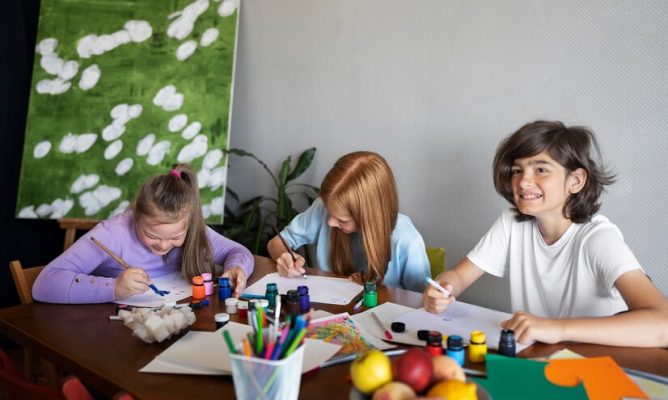
Students worldwide are grappling with the classic conundrum of fitting academic obligations and personal interests into a harmonious schedule. Stress, an unwelcome but common companion of the educational journey, often rears its head when the balance is skewed. This is why understanding different techniques of tackling stress is important.
Whether it’s preparing for exams, juggling coursework, or striving toward that coveted degree, the pursuit of academic success can take a toll on mental and physical well-being.
Recognizing the need for equilibrium is the first step toward a healthier, more productive life as a student. Below, we explore guided strategies to help manage stress and cultivate a balanced lifestyle.
Incorporating Hobbies Into a Busy School Schedule
Amidst the hustle of academic obligations, hobbies can fall by the wayside. However, integrating personal interests into a busy school schedule is vital for mental health and creativity.
Hobbies provide an outlet for stress, enable new learning experiences and contribute to a well-rounded life. They can revitalize a tired mind, infuse energy into mundane tasks, and provide a sense of accomplishment outside the realm of academics.
One means to include interests is by setting aside dedicated time each week for hobbies, treating them with the same importance as other responsibilities. This not only ensures regular engagement but also gives students something enjoyable to look forward to, breaking up repetitive study schedules.
Moreover, identifying hobbies that are both fulfilling and conducive to short timeframes can offer quick bursts of enjoyment without requiring lengthy time commitments.
Contrary to popular belief, sometimes leisure activities can even complement one’s educational pursuits. For example, engaging in social casinos can sharpen mathematical and strategic thinking. Casino games are a great way to enjoy downtime.
By viewing hobbies as complementary rather than supplementary to education, students can appreciate their dual value more fully.
Strategies for Effective Time Management in Academic Settings

Effective time management sits at the heart of student success and stress reduction. Developing a structured daily routine empowers students to allocate adequate time for studies, extracurricular activities, and relaxation.
Prioritizing tasks by urgency and importance can prevent procrastination and last-minute cramming, notorious stress amplifiers. Carving out consistent study times can also enhance focus and maximize productivity.
For those pursuing higher education, especially while managing other commitments, online options such as pursuing an MBA degree online, can offer the flexibility necessary to juggle various responsibilities. It enables the integration of learning into a personalized schedule, allowing students to adapt their study times to when they perform best.
Furthermore, breaking down larger projects into smaller, manageable tasks can make daunting assignments feel less overwhelming.
Though schedules are important, rigidity can sometimes be counterproductive. It’s essential to build in buffer times to accommodate the unpredictable nature of life. Additionally, students should not overlook the importance of regular breaks to recharge the brain and prevent burnout.
The Pomodoro Technique, a time management method that uses timed intervals of focused work followed by short breaks, can be a game-changer for those struggling with attention and stamina.
The Role of Mindfulness and Relaxation Techniques in Stress Reduction

With the rigors of academic life, the practice of mindfulness and relaxation techniques has become more pertinent than ever.
These methods empower students to center themselves in the present moment, distancing themselves from the stress of past or future academic worries. Mindfulness activities, such as meditation or deep breathing exercises, can reduce anxiety and improve focus, potentiating a clearer mind for tackling academic tasks.
Relaxation techniques, on the other hand, cater to unwinding the body and mind after intensive study sessions. Practices such as progressive muscle relaxation, yoga, or even simple stretching exercises can alleviate physical tension associated with prolonged sitting or computer use. Additionally, they can enhance sleep quality, further contributing to stress reduction and better academic performance.
Mindful Techniques which can Help You Relax
Among all the stress tackling techniques, there is nothing compared to mindfulness. If you are able to master this technique, your stress will be halved. This is because, no matter the stress you now will know how to manage it.
These are some of the common mindful techniques which you should definitely try today:
Deep Breathing
Here, among the basic yet very effective mindfulness techniques, this provides an example. When overwhelmed, it helps to direct your attention to spending just a moment on your inhale and exhale. Inhalation through your nose slowly and deeply. Notice where the chest and belly rise.
Follow this with a deep exhalation through the mouth with the same slow speed. Repeat this several times. Deep breathing is a good way to give your heart enough time and slow down the stress in your body.
Body Scan Meditation
The attention sequence enhances the effect and involves paying attention to a different part of your body, with every spine starting from the head and ending at the toes. The first thing you will need to do is lie down or sit comfortably and close your eyes.
Then, you should focus on your breathing. Now, move your focus slowly from one part of your body to another, locating any tension, pain, or unique sensations. The aim is not to let thoughts arise but to be aware without trying to correct them.
Mindful Walking
Instead of braving the hustle and bustle of your college campus, go for a mindful walk to your next class. It further emphasizes the significance of focusing on every step you take, the movement of your legs, touching your feet with the ground, and contact with the air on your skin.
Conscious walking can turn a rutting activity into a relaxation technique that can help you stay in reality at the moment in time.
Gratitude Journaling
By keeping a gratitude journal, you will most likely pay attention to the positive sides of your life, which can be of tremendous use, particularly when you encounter great stress.
A gratitude list is to be written daily with three things you’re grateful for. This simple technique will make your mind switch from negative thinking to global feeling, reducing stress levels, thus reminding you of the good and beautiful things in life.
Guided Imagery
Put all your creative power into the feelings and images of your happy and relaxing place. Perhaps the beach or a garden or perhaps somewhere somewhere you feel comfortable. Close your eyes, shut your other senses, and try to realize it.
To this end, you should see this place in the same detail you did before you opened your eyes. Ponder the thoughts of tapered flags, patriotic melody, and smells from the barbecue. With such a skill, you can minimize anxiety and possibly induce relaxation.
Mindful Eating
This approach is all about full mindfulness when dealing with tasting food and drinks. Slow down to eat, savor every bit, and notice the variety of tastes, textures, and smells of your eating. Take time to appreciate it.
Mindful eating can enhance your pleasure of meals and form a barrier against overeating as you become more aware of your state of hunger and satiation.
Short Mindfulness Exercises
If time is not your friend, just a few minutes of mindfulness can already make the difference. For people with little meditation experience, a guided meditation app for a few minutes will help.
These short pauses from your monotonous life can allow your mind to refresh and reduce stress.
Building a Support System for a Balanced Student Lifestyle

No student is an island, and establishing a robust support system can make the academic journey less daunting. A strong network of friends, family, and educational professionals can provide emotional support, practical advice, and a listening ear when challenges arise.
Support systems can also hold students accountable to their commitments, encouraging them to stick to their schedules and pursue their hobbies with vigor.
In addition, peer study groups offer mutual benefits that extend beyond the academic sphere. They create opportunities for social interaction, collaborative learning, and the exchange of stress-coping strategies.
Group members can motivate each other, share insights, and navigate the intricacies of their courses together, making the workload less intimidating and more manageable.
Overall, the key to overcoming stress as a student lies in acknowledging its presence and taking intentional steps to establish a balanced lifestyle. By deliberately sculpting a life that values both academic achievement and personal fulfillment, students can navigate their educational journeys with confidence and joy.
Read More…
How To Use Turmeric For Upset Stomach? Some Tips!
What Is Table Shower Massage? What You Need To Know About It?
What Is Table Shower? What You Need To Know About It?
















